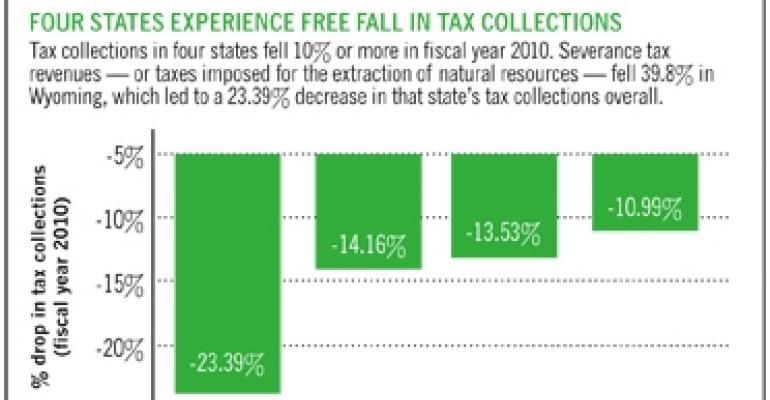State government tax collections decreased $14.3 billion to $704.6 billion in fiscal year 2010, a nearly 2% drop, according to the U.S. Census Bureau. The setback follows a $65.8 billion decrease in 2009. The data released in March comes from the 2010 Annual Survey of State Government Tax Collections, which contains annual statistics on the fiscal year tax collections of all 50 state governments, including receipts from licenses and compulsory fees. Tax revenues also include related penalty and interest receipts of the governments.
To offset the drop in revenues, states are downsizing and shedding costs, and that includes cutting back on office space. According to The Wall Street Journal, J.P. Morgan Chase & Co. analysts stated in a note to clients recently that real estate investment trusts, or REITs, with a lot of government exposure "should be watched more closely in a budget-tightening environment as renewals may not be the lay-ups they once were." The newspaper goes on to report that REITs with lots of government leases have lagged behind peers in recent months.

According to the U.S. Census Bureau’s survey of state government tax collections, corporate net income tax revenue was $38.2 billion, down 6.6%, while tax revenue on individual income was $236.4 billion, down 4.4%. General sales tax revenue was $224.5 billion, down 1.8%. These taxes comprised 70.8% of all state government tax collections nationally.
Eleven states saw increases in total tax revenue in fiscal year 2010, led by North Dakota (9.6%), North Carolina (4.8%), Nevada (4%), and California (3.8%). The states with the largest total tax revenue decreases were Wyoming (23.4%), Louisiana (14.2%), Oklahoma (13.5%), and Montana (11%).
States with the largest percent decrease in revenue from individual income taxes were Louisiana (22.2%), Tennessee (22.2%), North Dakota (18%), and New Hampshire (16.2%).
The data does not include employer and employee assessments for retirement and social insurance purposes. Also excluded are collections for the unemployment compensation taxes imposed by each of the state governments.
The data includes tax collections for state governments only; it does not include tax collections from local governments.

